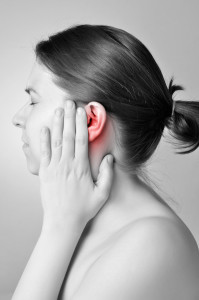TMJ Disorder: What are the symptoms?


What is TMJ disorder?
TMJ disorder involves the dysfunction of the temporomandibular joint and the side effects that accompany it. The temporomandibular joint (TMJ) facilitates all mouth movement because it connects the jawbone to the skull. The TMJs are located on each side of the face just below the ears. The TMJs work in harmony with muscles and ligaments as well. If the TMJs or surrounding support tissues are strained or stressed, patients can experience symptoms such as facial pain and reduced oral function.
A strained or stressed TMJ can lead to continued dysfunction that ultimately affects one’s daily life. For example, patients with this condition may have difficulty speaking and eating. Debilitating facial pain and headaches can occur. TMJ dysfunction tends to flare up when patients are stressed and anxious. This is likely because many people tend to clench their teeth and jaw when angry or upset. Unfortunately, TMJ dysfunction and clenching/grinding one’s teeth can lead to tooth wear, which requires restorations like fillings and crowns.
How is TMJ disorder diagnosed and treated?
When diagnosing and treating TMJ disorder, our dentist will consider many factors. When treating TMJ dysfunction, methods can vary. Dental restorations may be required to protect teeth from damage and rebuild a patient’s occlusion. Physical therapy may be recommended to ease and relax facial muscles and the TMJ, too. If stress and anxiety are the underlying cause of TMJ symptoms, we might suggest behavioral and lifestyle changes.
Call our office today to schedule a check-up or consultation regarding your jaw pain with our caring dentist at Howl Dental.